Related Research Articles

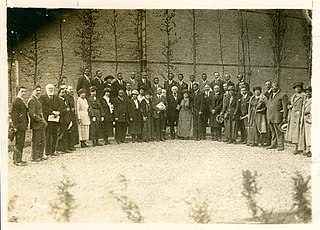
The Pan-African Congress (PAC) was a series of eight meetings which took place on the back of the Pan-African Conference held in London in 1900. The Pan-African Congress gained a reputation as a peacemaker for decolonization in Africa and in the West Indies. It made a significant advance for the Pan-African cause. One of the group's major demands was to end colonial rule and racial discrimination. It stood against imperialism and it demanded human rights and equality of economic opportunity. The manifesto given by the Pan-African Congress included the political and economic demands of the Congress for a new world context of international cooperation and the need to address the issues facing Africa as a result of European colonization of most of the continent.

The Defiance Campaign against Unjust Laws was presented by the African National Congress (ANC) at a conference held in Bloemfontein, South Africa in December 1951. The Campaign had roots in events leading up the conference. The demonstrations, taking place in 1952, were the first "large-scale, multi-racial political mobilization against apartheid laws under a common leadership."
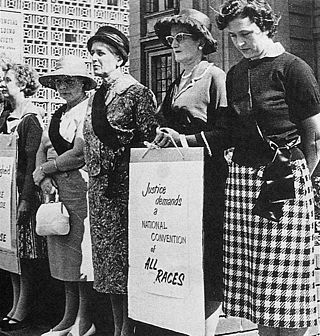
The Black Sash is a South African human rights organisation. It was founded in Johannesburg in 1955 as a non-violent resistance organisation for liberal white women.
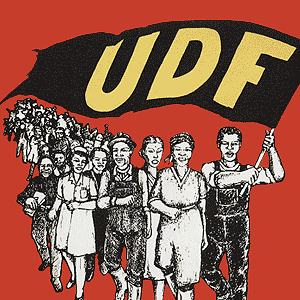
The United Democratic Front (UDF) was a South African popular front that existed from 1983 to 1991. The UDF comprised more than 400 public organizations including trade unions, students' unions, women's and parachurch organizations. The UDF's goal was to establish a "non-racial, united South Africa in which segregation is abolished and in which society is freed from institutional and systematic racism." Its slogan was "UDF Unites, Apartheid Divides." The Front was established in 1983 to oppose the introduction of the Tricameral Parliament by the white-dominated National Party government, and dissolved in 1991 during the early stages of the transition to democracy.

The concept of a Volkstaat, also called a Boerestaat, is a proposed view to establish an all-White Afrikaner homeland within the borders of South Africa, most commonly proposed as a fully independent Boer/Afrikaner nation. The concept excludes Afrikaans-speaking Coloureds but accepts South Africans of English ancestry and other White South Africans, if they accept Afrikaner culture and customs.
The Congress of the People was a gathering organised by the National Action Council, a multi-racial organisation which later became known as the Congress Alliance, and held in Kliptown on 26 June 1955 to lay out the vision of the South African people. The Freedom Charter was drawn up at the gathering, which was statement of core principles of the Alliance and a symbol of internal resistance against apartheid.
Lobolo or lobola in Zulu, Xhosa, Swazi, Silozi, Shona and northern and southern Ndebele, and mamalo in Tshivenda language, sometimes referred to as "bride wealth" or "bride price" is a property in livestock or kind, which a prospective husband, or head of his family, undertakes to give to the head of a prospective wife's family in gratitude of letting the husband marry their daughter.
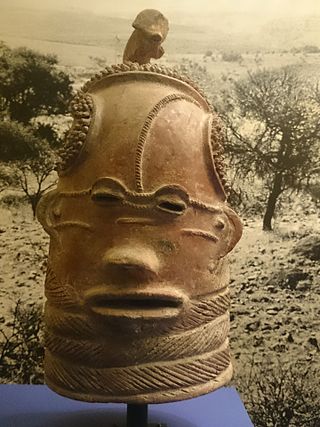
South African Bantu-speaking peoples represent the overwhelming majority ethno-racial group of South Africans. Occasionally grouped as Bantu, the term itself is derived from the English word "people", common to many of the Bantu languages. The Oxford Dictionary of South African English describes "Bantu", when used in a contemporary usage and or racial context as "obsolescent and offensive", because of its strong association with the "white minority rule" with their apartheid system, however, Bantu is used without pejorative connotations in other parts of Africa and is still used in South Africa as the group term for the language family.

Lulama "Lulu" Marytheresa Xingwana is a South African politician who served as Minister for Women, Children and People with Disabilities from November 2010 to May 2014. Previously she held the position of Deputy Minister of Minerals and Energy from 2004 to 2006 and was Minister of Agriculture and Land Affairs from 2006 to 2009, succeeding Thoko Didiza.
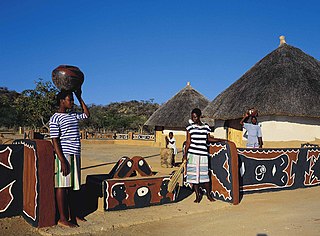
The Pedi or Bapedi, also known as the Sotho, Basotho, Northern Sotho, Basotho ba Lebowa, Transvaal Sotho, Marota, or Bamaroteng are a Sotho-Tswana ethnic group that speak Pedi or Sepedi, which is one of the 12 official languages in South Africa. They are primarily situated in Limpopo, Gauteng and northern Mpumalanga.

It is thought that multiple ethnic groups in South Africa have long-standing beliefs concerning gender roles, and most are based on the premise that women in South Africa are less important, or less deserving of power, than men. Some view African traditional social organizations as male centered and male dominated. One prevailing caricature of Afrikaner religious beliefs includes a strong emphasis on the theoretically biblically based notion that women's contributions to society should normally be approved by, or be on behalf of, men. Claims are even made of modern sexism and Christianity being introduced into South Africa by the ancestors of the Afrikaner diaspora.
South African customary law refers to a usually uncodified legal system developed and practised by the indigenous communities of South Africa. Customary law has been defined as
an established system of immemorial rules evolved from the way of life and natural wants of the people, the general context of which was a matter of common knowledge, coupled with precedents applying to special cases, which were retained in the memories of the chief and his councilors, their sons and their sons' sons until forgotten, or until they became part of the immemorial rules.

The Trưng sisters' rebellion was an armed civil uprising in the south of Han China between 40 AD and 43 AD. In 40 AD, the Vietnamese leader Trưng Trắc and her sister Trưng Nhị rebelled against Chinese authorities in Jiaozhi. In 42 AD, Han China dispatched General Ma Yuan to lead an army to strike down the Yue rebellion of the Trưng sisters. In 43 AD, the Han army fully suppressed the uprising and regained complete control. The Trưng sisters were captured and beheaded by the Han forces, although Vietnamese chronicles of the defeat records that the two sisters, having lost to Han forces, decided to commit suicide by jumping down the Hát Giang river, so as not to surrender to the Han.
Makwena Lydia Komape-Ngwenya died 11 October 2023, also known as Lydia Kompe, was a retired South African politician, activist, and trade unionist. She represented the African National Congress in the National Assembly from 1994 to 2009 and in the Limpopo Provincial Legislature from 2009 to 2019.
Sister Mary Bernard Ncube was a South African religious sister and anti-apartheid activist. As a religious sister, she often faced criticism from the church over her politics, including her stance on abortion. Because of her anti-apartheid activities, she was often arrested and is probably the first sister to be arrested in South Africa.

Sizani Ngubane was a South African activist who worked for rural women's rights. She was the founder of the Rural Women's Movement (RWM) which originated in her peace-building efforts in the final years of minority-rule wherein she brought women together across partisan lines to end political violence. RWM was formally registered in 1998. Working on issues central to its constituency, rural women and girls, RWM would come to number over 50,000 members across KwaZulu-Natal. The movement works both at the grassroots and policy levels on issues including women's access to land rights, ending gender-based violence, promoting food sovereignty and fostering healthy, democratic rural communities. Sizani Ngubane was recognized for her work as the 2018 NGO CSW Woman of Distinction and as a 2020 finalist for the Martin Ennals award.
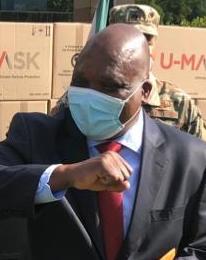
Mathume Joseph Phaahla is a South African politician who is currently serving as the Minister of Health since August 2021. He was formerly the Deputy Minister of Health from May 2014 to August 2021. He had been a deputy minister since May 2009, when he joined the National Assembly. He is also a member of the National Executive Committee of the African National Congress (ANC).

Eswatini nationality law is regulated by the Constitution of Eswatini, as amended; the Swaziland Citizenship Act, and its revisions; and various international agreements to which the country is a signatory. These laws determine who is, or is eligible to be, a national of Eswatini. The legal means to acquire nationality, formal legal membership in a nation, differ from the domestic relationship of rights and obligations between a national and the nation, known as citizenship. Nationality describes the relationship of an individual to the state under international law, whereas citizenship is the domestic relationship of an individual within the nation. Eswatini nationality is typically obtained under the principle of jus soli, i.e. by birth in Eswatini, or jus sanguinis, born to parents with Eswatini nationality. It can be granted to persons with an affiliation to the country, or to a permanent resident who has lived in the country for a given period of time through naturalisation or the traditional khonta system.
Happy Joyce Mashamba was a South African politician and veteran of the African National Congress (ANC). At the time of her death, she was Member of the Executive Council (MEC) for Agriculture and Rural Development in the provincial government of Limpopo. She was also a member of the Central Committee of the South African Communist Party and a former member of the ANC National Executive Committee and the ANC Women's League National Executive Committee.
References
Citations
- 1 2 Moshenberg, Dan (21 February 2014). "The Traditional Courts Bill is dead. Long live Sizani Ngubane!". Women in and Beyond the Global. Retrieved 17 September 2016.
- 1 2 3 Mann, Michelle (March 2001). "Access to Land" . World & I. 16 (3): 202. Retrieved 17 September 2016– via EBSCOhost.
- ↑ Moore, Elena; Himonga, Chuma (1 March 2016). "South Africa: Customary Marriage - Is the Law Working?". All Africa. Retrieved 17 September 2016.
- ↑ Haffajee, Ferial (1999). "South African: Blending Tradition and Change" . UNESCO Courier. 52 (11): 33. Retrieved 17 September 2016– via EBSCOhost.
- 1 2 Bachram, Heidi (2007). "Power Surge" . New Internationalist (400): 9. Retrieved 17 September 2016– via EBSCOhost.
- ↑ "National Movement of Rural Women". National Movement of Rural Women. Retrieved 17 September 2016.
- ↑ Transvaal Rural Action Committee (April 1994). "The Rural Women's Movement: Holding the Knife on the Sharp Edge". Transvaal Rural Action Committee Publication.
- ↑ SPEAK 1994, p. 6.
- ↑ "Lydia Kompe". South African History Online. 14 February 2013. Retrieved 14 September 2016.
- ↑ Kramer, Melinda (June 2006). "Women's Global Green Action Network" . Earth Island Journal. 21 (3): 16. Retrieved 17 September 2016– via EBSCOhost.
- ↑ West, Edward (9 July 2012). "A Lifetime of Fighting for Women's Rights". Business Day BD Live. Retrieved 17 September 2016.
- ↑ Lee, Peta (8 April 2015). "Skills Training for Rural Women". The Mercury. Archived from the original on 8 October 2016. Retrieved 19 September 2016.
Sources
- "Lydia Kompe: Fighting for Rural Rights". SPEAK. April 1994. Retrieved 14 September 2016– via South African History Online.